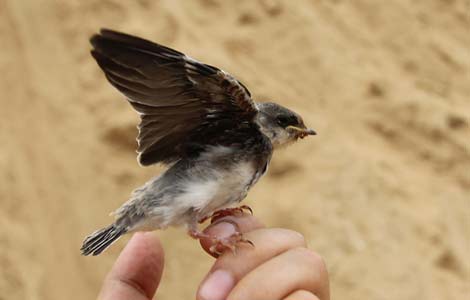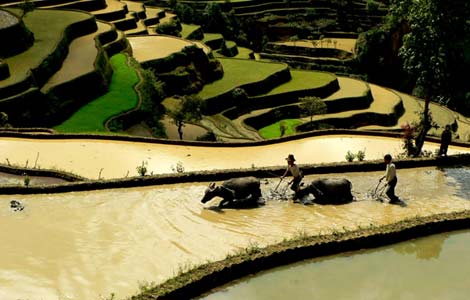Divining a future for heritage
Updated: 2013-06-24 07:42
By Zhang Zixuan (China Daily)
|
||||||||
Lu Wenxue's sacrifice for ethnic Hani customs is carrying on the tradition of ritual sacrifice and festivals.
The 60-year-old is a Yunnan provincial-level inheritor of this dimension of folk culture in Yuanyang county's Dayutang village, where all 394 residents from 101 families are pure Hani.
Lu and five younger inheritors divine the auspicious dates and host rituals in the Honghe Hani and Yi autonomous prefecture.
"Farmland and cattle were the only Hani status symbols in the past," says Zhang Hongzhen, nomination group leader and Hani Rice Terraces Administrative Bureau director.
"Therefore, most rituals are about harvests."
Zhang belongs to an association dedicated to preserving Hani terrace culture.
She explains her ethnic group worships nature, gods and ancestors.
In February, they celebrate the Angmatu Festival to offer sacrifices to the agriculture god and other deities. It is the overture to spring plowing.
They butcher pigs and deliver pork to every household, symbolizing the bounty from the gods.
A two-day Long Street Banquet is also hosted. Every family brings the best food to share.
Dishes are made of the terraces' products, such as loach and salted duck eggs. Red rice is ground into flour to make noodles, tofu and crackers.
The transplanting of rice seedlings begins after Angmatu. In June, Hani butcher cattle and swing to worship heaven and pray for a good harvest.
If the harvest does come by fall, the Hani butcher pigs and chickens to thank their ancestors. They visit friends, host weddings or build houses during that time.
April is the only month without a Hani festival.
Puffing from a handmade bamboo water pipe, Lu says the rice terraces have not changed in his lifetime. He strongly supports their World Heritage designation.
"Hani customs are passed down from our ancestors and cannot be lost in our hands," he says.
"The World Heritage listing will increase the government's attention to our culture, to our language, costumes, farming and ritual sacrifice, so they can be passed down."
zhangzixuan@chinadaily.com.cn
(China Daily USA 06/24/2013 page9)
Most Viewed
Editor's Picks

|

|

|

|

|

|
Today's Top News
H7N9 bird flu less deadly than H5N1
Snowden exposes more US hacking, then flies
China shares extend losses
Xi vows bigger stride in space exploration
Mandela's condition critical
Suspect in shooting spree detained
Mountaineers killed in Pakistan
Foreign firms eye new 'opening-up'
US Weekly

|

|















